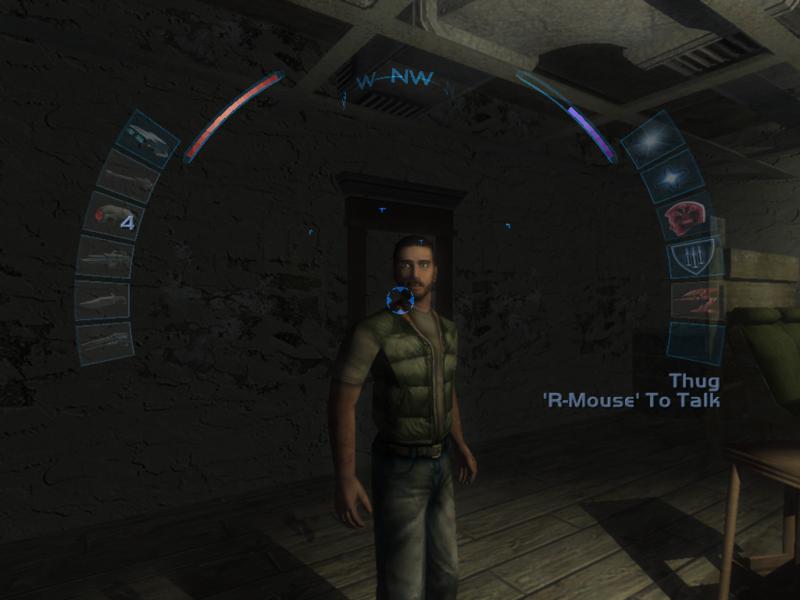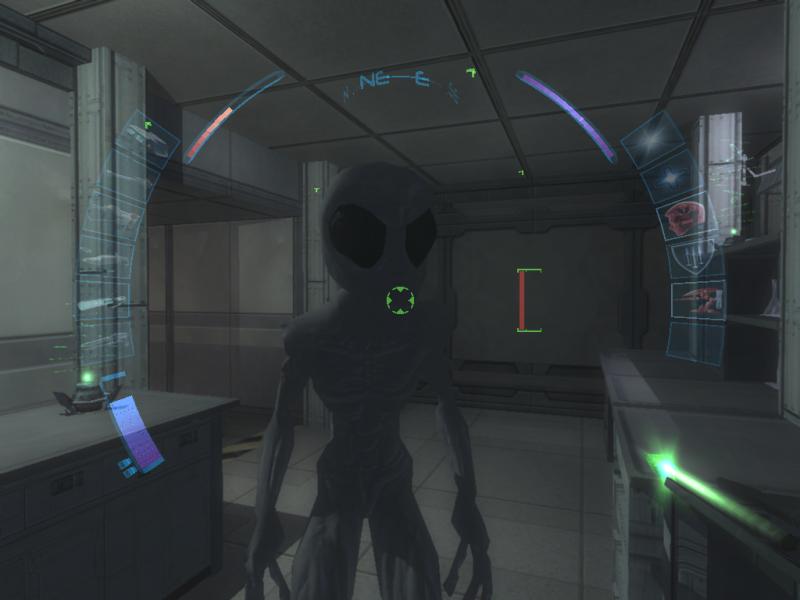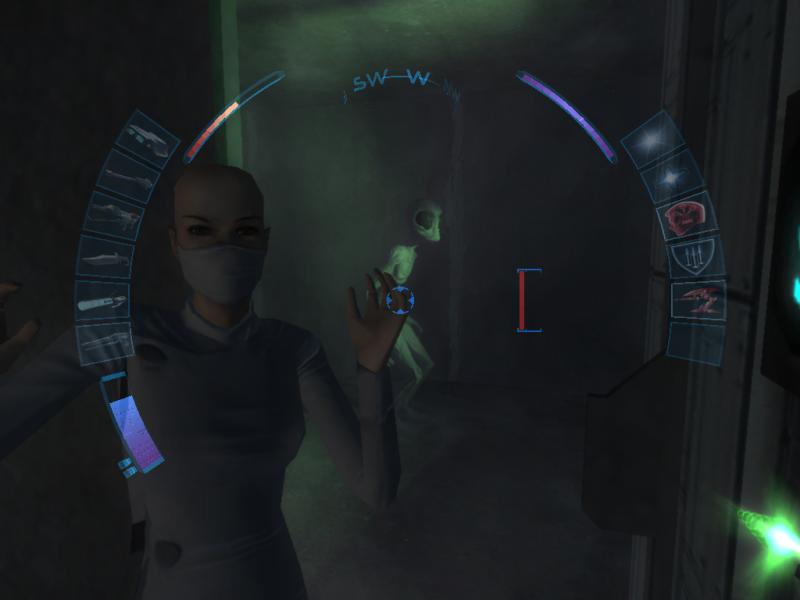Search
[{{{type}}}] {{{reason}}}
{{/data.error.root_cause}}{{{_source.title}}} {{#_source.showPrice}} {{{_source.displayPrice}}} {{/_source.showPrice}}
{{#_source.showLink}} {{/_source.showLink}} {{#_source.showDate}}{{{_source.displayDate}}}
{{/_source.showDate}}{{{_source.description}}}
{{#_source.additionalInfo}}{{#_source.additionalFields}} {{#title}} {{{label}}}: {{{title}}} {{/title}} {{/_source.additionalFields}}
{{/_source.additionalInfo}}- Details
- Category: Computer
- By Daniel Cullen
- Hits: 3591
Deus Ex: Invisible War (PC)

Deus Ex: Invisible War
Developed By: Ion Storm
Published By: Square Enix
Released: March 5, 2004
Available On: Steam (Microsoft Windows)
Genre: FPS/Sci-Fi Adventure RPG
ESRB Rating: Mature (Blood, Violence)
Number of Players: Singleplayer
Price: $6.99
(Humble Store Link)
DISCLAIMER: This game required I used the fan-made Unified Patch in order to allow me to play this game at all. Everything in this review should be regarded with this in mind.
In 2000, Ion Storm released Deus Ex, a game where your choices mattered, all playstyles were viable, and every tinfoil hat conspiracy theorist was right. It had its rough spots but overall proved an excellent game. Invisible War is the 2003 sequel (released in 2004) that attempts to maintain the excellence of the original Deus Ex, though its ability to do so is a mixed legacy.
In the original game, protagonist J.C. Denton stopped billionaire megalomaniac Bob Page from trying to become a digital overlord over all of humanity's communications and technology. In the process of trying to fix things to undo what Page had started, J.C. accidentally triggered the Collapse, in which all global communication was severed and humanity entered a worldwide depression.
Twenty years later, two factions called the World Trade Organization and The Order are vying for world control, and several other groups like the survivalist Omar and the extremist reborn Knights Templar have ideas of their own on how the world should rise from the ashes of the Collapse. As for you, you are a student of the Tarsus Academy, a system of schools that test bio-modifications on certain applicants to make them useful agents for all walks of life, or so it seems, until the facility you, Alex Denton (who can be male or female), are training at is attacked.

Strong Points: Improved character modeling from the first game
Weak Points: Much more simplified gameplay and tiny levels
Moral Warnings: A world religion with many heretical if vague concepts cribbed from many other religions; mentions of drug use; lots of violence; options to do many unethical acts including theft and murder; mildly sexualized outfits for a few characters; some crude language; some blasphemous references to Christianity (generally from the villains, one faction has more neutral and even positive references to Christianity)
Since then, you discover you are not only at the center of one conspiracy that could change the fate of the world post-Collapse, you are now also the potential agent of several other interlocking conspiracies that could reshape mankind's destiny. And it's up to you to decide who will reforge society from the Collapse's ashes.
As a sequel to the original Deus Ex, Invisible War has most of the same basic elements. There are multiple game paths to the same objective, several factions, and endings for them, and several different outcomes for certain activities. Unfortunately, a technical limitation as a result of how the game was developed hobbles all the above.
The original Deus Ex was designed for PC and later ported to PS2, which had to redesign a few areas and streamline the game somewhat to accommodate the PS2's limitations, but otherwise was similar to the PC version. Invisible War was designed for Xbox first, then ported to PC, meaning the PC version is subject to the limitations of the Xbox version, and that includes greatly cramped areas and forced streamlining of many game elements for a console.
This has several issues gameplay-wise. For one, the wide-open areas to explore are now quite claustrophobic and cut down into many smaller areas, limiting room for combat and exploration. To its credit, the game still tries to deliver the latter, and the former did get some improvements such as smarter enemy AI and better-aiming controls for the player compared to the original. Another problem is that the interface was designed for the Xbox controller and it somewhat unintuitive for PC, though the in-game tutorial does a decent job compensating for this. Finally, a lot of the complexity that made the original interesting was sacrificed for Xbox limitations.
Lockpicking and electronic locks are now rolled into one, which makes choosing between picking a lock and brute-forcing the keypad electronic locks easier, but makes player choices for alternative playstyles smaller. Combat still has lethal and nonlethal options, but much less consequence is assigned going either route, so the player is less encouraged to refrain from bloodshed or the reverse compared to the original. The nanotech mods were simplified, mainly for the better, but it's now far easier to abuse them, which can kill some of the challenges from the original to be had in using them only when would be most needed. Finally, the game is oddly worse off for being completely open-ended.

Higher is better
(10/10 is perfect)
Game Score - 56%
Gameplay - 12/20
Graphics - 7/10
Sound - 5/10
Stability - 1/5
Controls - 3/5
Morality Score - 48%
Violence - 4/10
Language - 6/10
Sexual Content - 6/10
Occult/Supernatural - 6/10
Cultural/Moral/Ethical - 2/10
In the previous game, while you had complete freedom to complete objectives how you wished; your choice of a faction to work for was largely on rails until the end of the game, where you had to choose a side. Invisible War leaves you free to work for any faction you wish or even do objectives for all of them until the end, which does give more initial freedom, but makes the ending choices less meaningful. In the original, while forced to help out nigh all factions, you got a chance to learn their ideologies and faults, and when the time of decision came, it made picking who you would ultimately side with impactful. Invisible War's endings are all different, but all that changes in the end is who you have to fight; the final levels are essentially not much different. In the original, you could have vastly different ending level experiences depending on which faction you elected to support.
Graphics go for a continuation of the cyberpunk aesthetic the previous game did, but now it looks a lot less depressing and dark. While partially a stylistic choice, it does mute a lot of the oppressive atmosphere that made the original such a dark yet tense experience. Character models, lip-syncing, and other details are much improved from the first game, however, which are all welcome improvements.
Controls are serviceable on keyboard and mouse, but it's obvious this game was designed for a controller first. Navigating the interface via the keyboard is a bit difficult at first, but since there is no controller support, one will have to get used to this. Sounds are decent though not remarkable, and outside the opening theme, which is a rather beautiful remix of the original Deus Ex theme, is rather forgettable really. Voice acting is the only real bright spot, and even then the worst is just generic boring, not so bad it becomes a meme bad like the original, which was part of the charm to the original.
Stability is the worst part of this game. Even it's original 2003 release was not the most stable game in the world, and the Steam version, while being patched with the latest official patches, is a game that has been left to rot and requires the fan-made Unified Patch to be playable on modern PCs. Without it, multicore processors will not work well, if at all. Also, resolution support is absolutely terrible without the UF patch, and while there are some very minor issues like the occasional crash (though the frequency is quite rare) with the UF patch installed, this tends to be every several hours into play, not every 10-30 minutes like the game would be without the fan patch.
As for the moral side of things, violence is going to be a major way to solve problems like the last game. While nonviolent options exist, it's still possible to hurt and kill enemies quite badly, though the gore and blood displays are far less prevalent than the first game. Language can be crude at times, though it's about the same level as the first game, with lots of PG-13 level swearing from the cruder characters. Sexual content is somewhat less prevalent than in DX1, but much less than in the previous entry (mostly midriffs exposed at worst here, as opposed to even more revealing outfits some ladies sported in the prior DX).
The occult and supernatural are generally absent, this being a sci-fi game, but there is a major red flag concerning one of the factions. The Order is a faction that is supposed to be a world church that arose in the wake of the Collapse. Their beliefs are an incredibly generic mishmash of many other faiths, and while the only concretely defined morals they have are a denunciation of materialism and desecration of the human body with things not intended for it, they do contain some cross-like symbols as well as namedropping concepts from Islam, Hinduism, and Buddhism, among a few others. They have an extremist splinter faction called the Knights Templar that is the bloodthirsty fanatic aspect of their beliefs who are devoid of most of the more inoffensive traits of The Order (which does do genuine charity work for the lower classes in places). However, despite this good aspect, their beliefs are still an utterly heretical (from a Christian POV) religion, though one without a godhead or a concretely defined afterlife.

The ending paths all have their issues as well.
Aside from the endings, while there are options to do good things, like create a cure for a long-term ecological disease vector and help convince a religious fanatic of the Order to realize they were believing false doctrine, the option to do lots of vile things as well is still present. Worse, unlike the first game, it's still possible to kill anyone, including an entire school of children. Mentions of drug use are prevalent, and while alcohol is present, using it does have negative consequences and will poison you due to the biomodifications of your main character. Finally, there are fewer reasons to stay on a conscientious and moral path and less in-game motives to do so because the rewards and reminders to do so are far less prevalent than in the prior game, which had tangible results and benefits for showing humanity and moral restraint.
As a Deus Ex game, it has its moments, but it feels like a cramped, Diet Coke version of the original game. The need for a fan patch to make it remotely playable on modern Windows computers (with even more variable success on Linux via Wine/Proton) does not make this a game I'd recommend either. Morally, it's quite disappointing, especially because the first game gave actual consequences that encouraged moral behavior, which is far less emphasized in this game, while still letting you act like an amoral sociopath with far fewer consequences.
Overall, unless you are a die-hard Deus Ex fan, and even then I find it hard to recommend, this is not something I'd expect people to play, and honestly, it could have been far better than what it was.






